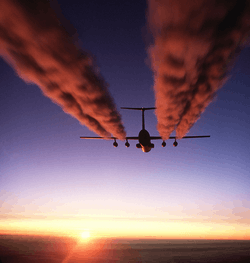Flight shame
Flight shame or flygskam is an anti-flying movement that started in 2018 in Sweden and gained traction the following year throughout northern Europe.[1] Flygskam is a Swedish word that literally means “flight shame”.[1] The movement discourages people from flying to lower carbon emissions to thwart climate change.[1]

Origins
Staffan Lindberg, a Swedish singer, was reported to have coined the term in 2017.[2][3] Björn Ferry, an Olympic athlete, was also one of the first notable champions of the concept.[1] Malena Ernman, an opera singer and the mother of teenage activist Greta Thunberg, also announced publicly that she would stop flying.[1] Thunberg helped popularize the movement.[4][5][6] The idea would continue to grow as other Swedish celebrities followed suit.[1] The word started to become mainstream amongst English speakers in 2019.[4]
Tågskryt
Tågskryt, a Swedish word that literally means “train brag”, has resulted from the flygskam movement.[1] This idea encourages people to travel by train rather than by plane.[1] Furthermore, it encourages people to utilize social media by posting pictures from their train trip and tagging it #tågskryt.[1]
Att smygflyga, which means “to fly in secret”, is also another term that has been derived from the flygskam movement.[5]
Impact
In Sweden, more people have used the train and domestic flying decreased in Sweden.[1][4] SJ, Sweden’s main train operator, reported that it sold 1.5 million more tickets in 2018 that the year prior.[5] According to Swedavia, Sweden’s airport operators, domestic travel decreased 9% from the previous year.[3] Figures of passengers at Sweden’s ten busiest airports decreased 5% in the summer of 2019 as compared to the year prior.[7]
The same pattern in Sweden was seen in Germany.[6] Deutsche Bahn AG railway service reported record high number of travelers in 2019.[5] German airports showed a decreased in passengers taking domestic flights, with a 12% decrease from November 2019 as compared to the year prior.[6]
In a survey of 6,000 people by the Swiss bank UBS, 21% of respondents in the United States, France, England and Germany said they decreased their flights in the past year.[2][8]
The airline industry also recognized the movement as a threat.[4] In 2019, at the annual International Air Transport Association (IATA) in Seoul, combating flygskam was discussed.[1] Some airlines, such as easyJet, stated they would spend tens of millions of pounds to buy carbon offsets.[4]
Ecologically, about 2.5 percent of global carbon emissions from humans come from commercial flights.[1][4] Additionally, planes emit other gases such as nitrogen oxide and contrails that also have an environmental impact.[4] At the time, the volume of flights was projected to expand, although the aviation industry was taking steps to decrease their emissions.[1]
In 2020, the COVID-19 pandemic caused global air travel to plummet as airlines cut up to 95% of their trips, dwarfing the impact of the flygskam movement.[9]
References
- Coffey, Helen (2019-06-05). "What is 'flygskam'? Everything you need to know about the environmental movement that's sweeping Europe". The Independent. Retrieved 2020-05-29.
- Cerullo, Megan (2019-10-03). ""Flight shame" could hurt airlines as travelers shun air travel". CBS News. Retrieved 2020-05-29.
- "Sweden's air travel falls as flight-shaming rises". BBC News. 2020-01-10. Retrieved 2020-05-29.
- Hook, Leslie (2019-12-29). "Year in a word: Flygskam". Financial Times. Retrieved 2020-05-29.
- Pesce, Nicole Lyn (2019-12-19). "How Greta Thunberg and 'flygskam' are shaking the global airline industry". MarketWatch. Retrieved 2020-05-29.
- Wilkes, William; Weiss, Richard (2019-12-19). "German Air Travel Slump Points to Spread of Flight Shame". Bloomberg. Retrieved 2020-05-29.
- "The Greta effect". The Economist. 2019-08-19. Retrieved 2020-05-29.
- "'Flight shame' could halve growth in air traffic". BBC News. 2019-10-02. Retrieved 2020-05-29.
- Kusmer, Anna (2020-04-03). "Coronavirus has changed how we transport goods and ourselves. But will it last?". The World from PRX. Retrieved 2020-05-29.